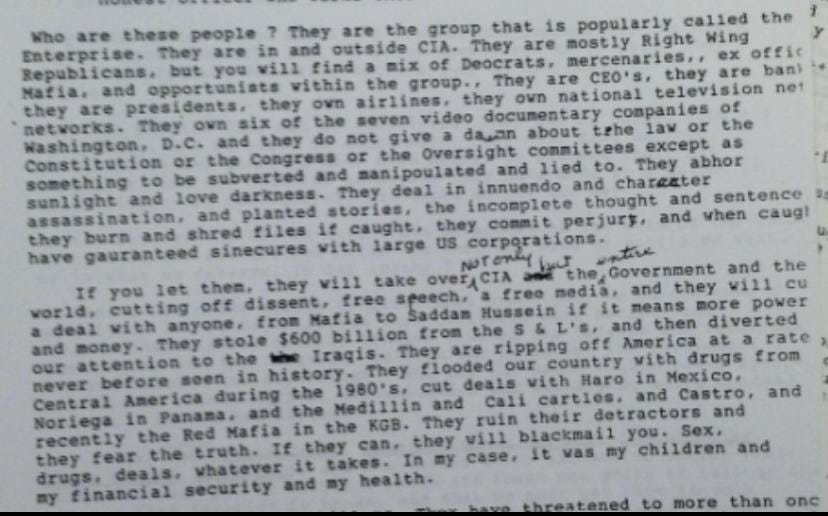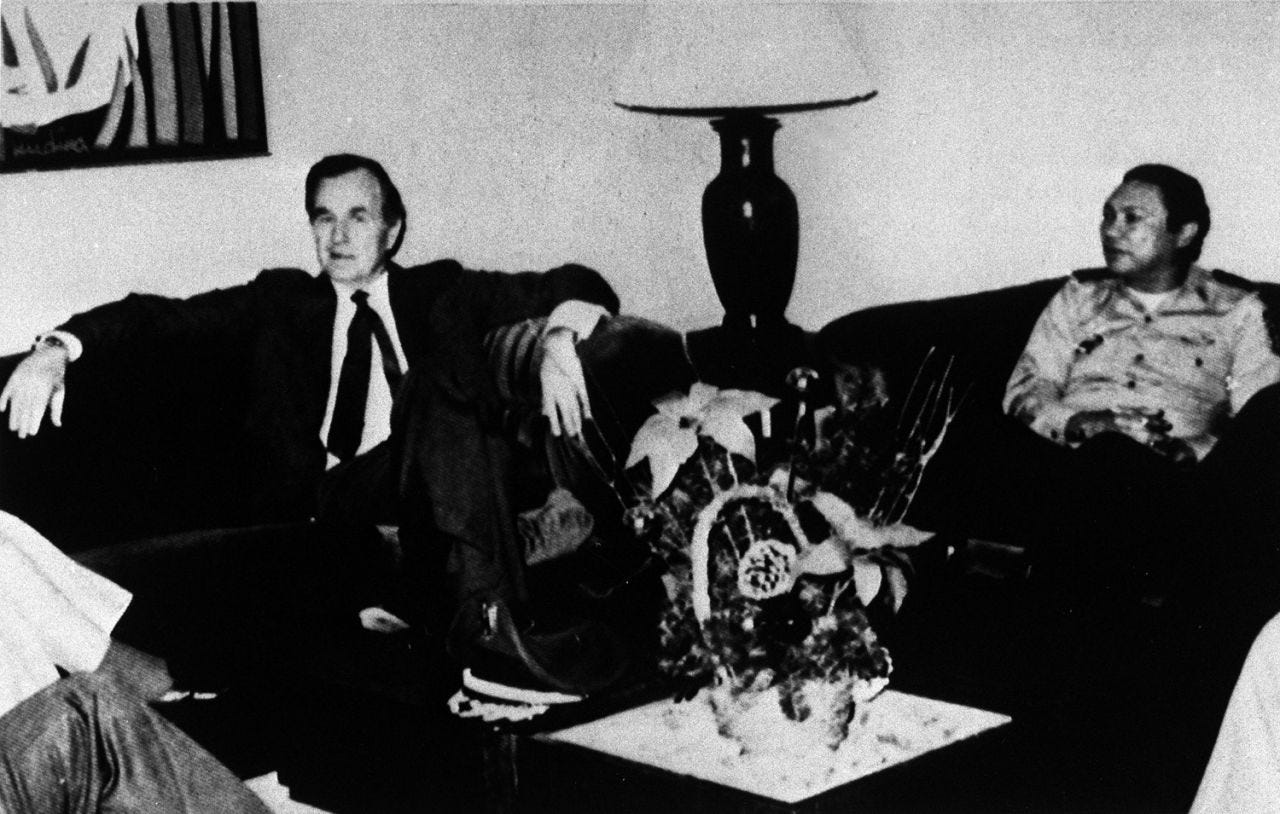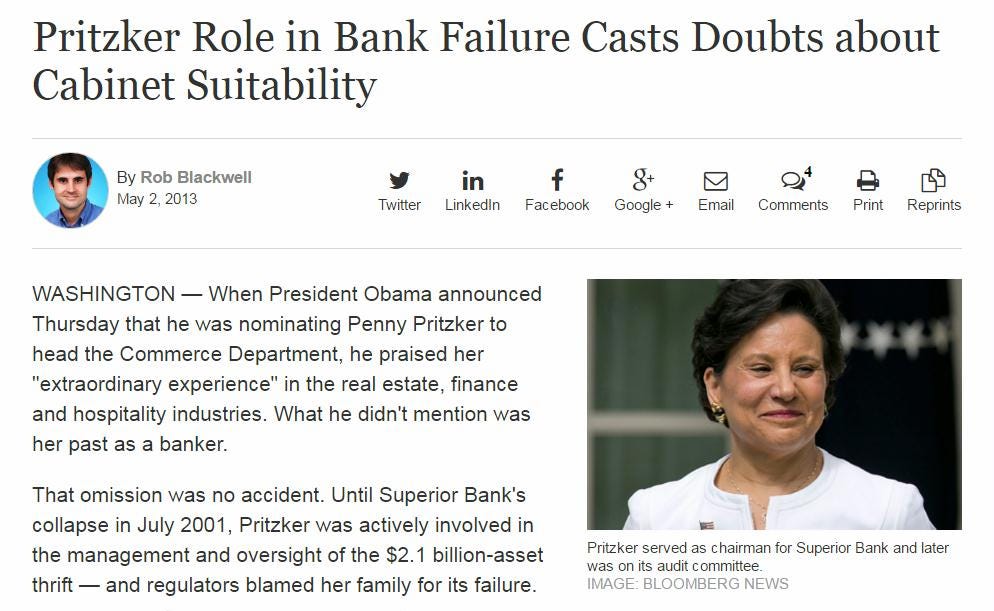The ends justify the means.
He "belonged to intelligence."
“Is the Epstein case going to cause a problem [for confirmation hearings]?” Acosta had been asked. Acosta had explained, breezily, apparently, that back in the day he’d had just one meeting on the Epstein case. He’d cut the non-prosecution deal with one of Epstein’s attorneys because he had “been told” to back off, that Epstein was above his pay grade. “I was told Epstein ‘belonged to intelligence’ and to leave it alone,” he told his interviewers in the Trump transition, who evidently thought that was a sufficient answer and went ahead and hired Acosta. - Vicky Ward
“You would think that every reporter in that room just has nothing to do anymore except figure out what [Acosta] meant by that. What do you mean this mass serial child-trafficker 'belongs to intelligence'? What did you mean by that? And nobody is asking him that question.” - Jocko Willink
Who are these people? They are the group that is popularly called the Enterprise. They are in and outside [the] CIA. They are mostly Right Wing Republicans, but you will find a mix of Democrats, mercenaries, ex officio Mafia and opportunists within the group. They are CEOs, they are bankers, they are presidents, they own airlines, they own national television networks. They own six of the seven video documentary companies of Washington, DC and they do not give a damn about the law or the Constitution or the Congress or the Oversight committees except as something to be subverted and manipulated and lied to.
They abhor sunlight and love darkness. They deal in innuendo and character assassination, and planted stories, the incomplete thought and sentence. They burn and shred files if caught, they commit perjury, and when caught they have guaranteed sinecures with large US corporations.
If you let them, they will take over not only [the] CIA but the entire government and the world, cutting off dissent, free speech, a free media, and they will cut a deal with anyone, from [the] Mafia to Saddam Hussein, if it means more power and money. They stole $600 billion from the S & L's and then diverted our attention to the Iraqis. They are ripping off America at a rate never before seen in history. They flooded our country with drugs from Central America during the - 1980s, cut deals with Haro in Mexico, Noriega in Panama, and the Medellin and Cali cartels, and Castro, and recently the Red Mafia in the KGB.
They ruin their detractors and they fear the truth. If they can, they will blackmail you. Sex, drugs, deals, whatever it takes.”
—Former CIA officer and Iran-Contra whistleblower Bruce Hemmings, circa 1990
The collapse of the millennia-old Chinese empire had brought chaos and rivalry between several new, republican contenders for power. The Allied forces supported the most powerful warlord Chiang Kai-shek—against the Japanese, and he relied heavily on drugs to finance his war effort, and to enrich himself. On the battlefields of Asia, Christian and liberal concerns over the immorality of the opium trade meant nothing. In Burma, the opium business simply slipped out of the hands of feudal Shan saohpas [princes or chiefs], and colonial tax collectors and bureaucrats—to be absorbed by the mighty war machine that was trying to halt the Japanese advance in the Far East.
During the war in the Kachin hills, opium was used for the first time ever to pay soldiers in northern Burma. When the British first raised the Kachin troops, called Northern Kachin Levies, their policy was to pay for local services in opium. This was done on a limited scale, but when US forces arrived, this changed dramatically.
- Bertil Lintner, Burma in Revolt
Simply stated, paper currency and even silver were often useless, as there was nothing to buy with money; opium, however, was the form of payment which everybody used. Not to use it as a means of barter would spell an end to our operations. Opium was available to agents who used it for a number of reasons, varying from obtaining information to buying their own escape. Any indignation felt was removed by the difficulty of the effort ahead. If opium could be useful in achieving victory, the pattern was clear. We would use opium.
- William Peers and Dean Brelis, Behind the Burma Road
I get it.
In war, you do what you need to do to beat the enemy. The Japanese were the enemy, opium was the currency of your allies, so you support opium networks as a means to an end. Whatever it takes. I think most people would support that.
But then that turns into this…
KABUL, Afghanistan — In his last phone call home, Lance Cpl. Gregory Buckley Jr. told his father what was troubling him: From his bunk in southern Afghanistan, he could hear Afghan police officers sexually abusing boys they had brought to the base.
“At night we can hear them screaming, but we’re not allowed to do anything about it,” the Marine’s father, Gregory Buckley Sr., recalled his son telling him before he was shot to death at the base in 2012. He urged his son to tell his superiors. “My son said that his officers told him to look the other way because it’s their culture.”
Rampant sexual abuse of children has long been a problem in Afghanistan, particularly among armed commanders who dominate much of the rural landscape and can bully the population. The practice is called bacha bazi, literally “boy play,” and American soldiers and Marines have been instructed not to intervene — in some cases, not even when their Afghan allies have abused boys on military bases, according to interviews and court records.
The policy has endured as American forces have recruited and organized Afghan militias to help hold territory against the Taliban. But soldiers and Marines have been increasingly troubled that instead of weeding out pedophiles, the American military was arming them in some cases and placing them as the commanders of villages — and doing little when they began abusing children.
“The reason we were here is because we heard the terrible things the Taliban were doing to people, how they were taking away human rights,” said Dan Quinn, a former Special Forces captain who beat up an American-backed militia commander for keeping a boy chained to his bed as a sex slave. “But we were putting people into power who would do things that were worse than the Taliban did — that was something village elders voiced to me.”
…After the beating, the Army relieved Captain Quinn of his command and pulled him from Afghanistan. He has since left the military.
…The American policy of nonintervention is intended to maintain good relations with the Afghan police and militia units the United States has trained to fight the Taliban. It also reflects a reluctance to impose cultural values in a country where pederasty is rife, particularly among powerful men…
OK, ponder the above paragraphs for a minute.
Meanwhile…
The Taliban vowed to ban Bacha Bazi and this resonated with many poor Afghans. So, when the Americans withdrew, the Taliban swept across the country as local support for the government that tolerated Bacha Bazi faded away.
So WTF were we doing in Afghanistan for 20 years? (Don’t say revenge for 9/11, because then we’d have been in Saudi Arabia and maybe other places instead. And no, I don’t want to go off on a 9/11 tangent.)
The evil of the Taliban was so great that we tolerated widescale child rape for 20 years? Committed by our allies?
What were we fighting for, exactly?
The ends justify the means?
What ends? We bailed.
This MartyrMade podcast has an epic intro starting one-minute in that covers my feelings here. It’s part one and two of an excellent series on Jeffrey Epstein.
(As an aside, I highly recommend this 2019 article on the Afghanistan fiasco, “AT WAR WITH THE TRUTH.” TL;DR: “the American people have constantly been lied to.”)
So anyway…
CIA Helped Quash Major, Star-Studded Tax Evasion Case (1980)
…For years IRS agents had been trying, without much success, to obtain documentary proof that Americans were using offshore banks in the Caribbean to hide income and evade taxes. One of the suspect banks was the privately owned, Nassau-based Castle Bank & Trust (Bahamas) Ltd.
…a computer printout of the bank's account holders -- some 308 names, including not only nationally known U.S. businessmen and entertainers but quite a few well-known organized crime figures as well. The account holders controlled about a quarter of a billion dollars in assets. To the jubilant agents the list presented the possibility of the single biggest tax-evasion strike in IRS history.
Their elation eventually faded, however, after Donald Alexander, then the IRS commissioner, announced that Project Haven, as the Caribbean investigation was called, was being suspended because the surreptitious acquisition of the list was an illegal search…
It now appears that pressure from the Central Intelligence Agency, rather than any legal problem, was what caused the Justice Department to drop what could have been the biggest tax evasion case of all time. Moreover, the supposed legal obstacle to using the Castle Bank Depositors' list was questionable at best -- the government already had in its possession the same list, legally obtained.
What caused the Justice Department to back off seems to have been the CIA's argument that pursuit of the Castle Bank would endanger "national security." This was involved because that bank, besides its possible use as a haven for tax evaders, was the conduit for millions of dollars earmarked by the CIA for the funding of clandestine operations against Cuba and for other covert intelligence operations directed at countries in Latin America and the Far East. A major tax evasion investigation of the bank probably would have endangered these CIA operations.
Castle Bank was set up and principally controlled by the late Paul Lionel Edward Helliwell, a Miami lawyer. Helliwell, who had longstanding ties to the U.S. intelligence community, was instrumental in helping to direct a network of CIA undercover operations and "proprietaries." (A proprietary is a concern secretly set up and controlled by the CIA, ostensibly as legitimate business.)
…On the list, either in their own names or under the names of trusts or companies they controlled, were such people as Chicago's Pritzker family, Detroit land developer Arnold Aronoff, Playboy magazine publisher Hugh Hefner, Penthouse magazine owner Robert Guccione, actor Tony Curtis, the former rock group Creedence Clearwater, and three men -- Morris Dalitz, Morris Kleinman and Samuel A. Tucker -- who have been described in Justice Department documents as organized crime figures.
Of course, having money on deposit in a foreign bank, by itself, is no evidence of wrongdoing. None of the above individuals, with the exception of Hefner, returned phone calls inquiring about the accounts…
The bulk of the Castle accounts are in the names of foreign entities, mostly Bahamian or Panamanian, according to the list. Other documents in Nassau show that the common thread of these companies is that they were mostly formed or controlled by Paul Helliwell and his associates.
The gruff Helliwell, 62 when he died on Christmas Eve 1976 from emphysema complications, was no stranger to the murky world of spying. During World War II he was chief of special intelligence in China for the Office of Strategic Services, the forerunner of the CIA.
In 1951, Helliwell helped set up and run Sea Supply Corp., a concern controlled by the CIA as a front. For almost 10 years, Sea Supply was used to supply huge amounts of weapons and equipment to 10,000 Nationalist Chinese troops in Burma as well as to Thailand's police.
One former federal official who helped scrutinize Castle says, "Castle was one of the CIA's finance channels for operations against Cuba." Helliwell reputedly was one of the pay-masters for the ill-fated Bay of Pigs invasion in 1961, as well as for other CIA operations throughout Latin America. In particular, the former federal official said, Helliwell was "deeply involved" in financing a series of covert forays between 1964 and 1975 against Cuba by CIA operatives working from Andros Island, the largest of the Bahamas.
A former member of Helliwell's law firm says it was general knowledge among the firm's members "that Castle was a CIA account," but that only Helliwell and two other lawyers had access to any information on the bank.
Dropping of Project Haven by the IRS caused tremendous turmoil within the tax-collecting agency. One IRS memo says that when the investigation was shut down there were 488 pending cases involving tax deficiencies of "hundreds of millions" of dollars. Many veteran IRS agents resigned. To this day the drain of taxable money through Bahamas banks is continuing, largely because that country's strict disclosure laws prevent outsiders from obtaining banking records…
A government official close to the Castle investigation says, "There was nothing sinister about why it [the investigation] didn't go anywhere. The CIA convinced Justice that exposure of castle and, of necessity, other Helliwell dealings, would compromise very sensitive and very significant intelligence operations. It's as simple as that."
It was the CIA's Office of General Counsel that apparently repeatedly requested the Justice Department to back away from Castle. A federal attorney, says he first learned of the CIA's involvement when John J. Greaney, a CIA attorney, asked Justice "to keep out of certain accounts a Castle because they were run by the agency."
…Other U.S. agencies were involved in Castle Bank's mysterious maneuverings. An affidavit by a State Department official on one occasion warned a federal court against "the anticipated revelation of illegal payoffs" in the Bahamas.
Apparently the Pritzker family was involved in more than one shady bank…
And, of course, the obligatory Jeff Epstein ties (March 2003):
Some of the businessmen who dine with him at his home—they include newspaper publisher Mort Zuckerman, banker Louis Ranieri, Revlon chairman Ronald Perelman, real-estate tycoon Leon Black, former Microsoft executive Nathan Myhrvold, Tom Pritzker (of Hyatt Hotels), and real-estate personality Donald Trump—sometimes seem not all that clear as to what he actually does to earn his millions.
But back to Castle Bank and it’s vital role in “significant intelligence operations” for the CIA, who was this central figure Paul Helliwell? For that we’ll go back in time…
Helliwell pioneered the art of illegally financing intelligence activity to avoid bureaucratic accountability…
As the KMT Army scattered in defeat, many of the troops made their way to Taiwan (then known as Formosa), but others went to Burma. The CIA decided that this remnant of Chiang's troops had to be kept armed for a future invasion of Communist China. The CIA created a pair of front companies to supply and finance the twelve thousand surviving KMT soldiers. The first was Civil Air Transport (CAT), a Taiwan-based airline, and the second was Sea Supply Corporation, a shipping concern in Bangkok that Helliwell founded. Through Sea Supply, Helliwell imported large amounts of arms for the KMT soldiers to keep the Burmese military from throwing them out of the country. The arms were ferried into Burma on CAT airplanes. CAT then used the "empty" planes to fly drugs from Burma to Taiwan, Bangkok, and Saigon. There the drugs were processed for the benefit of the KMT and Chiang Kai-shek's corrupt government on Taiwan.
[time passes]
…The primary objective of Helliwell's operations in Florida was to cement the CIA's relationship with organized crime. While in the OSS, Helliwell had developed connections to Santos Trafficante, Jr., who was the son of top Mafia don Santos Trafficante…
Trafficante and the CIA also had common business interests in Asia—specifically, the successful exportation of Chinese white heroin. Ever since the time of the Church Committee hearings in 1975, the CIA has successfully sold the idea that the only connection the Agency ever had to organized crime was in its vain attempts to assassinate Fidel Castro; but in reality, the relationship between the CIA's Ivy League brotherhood and the international "family" of criminals was much more extensive and complex. No one embodied these relationships more than Helliwell.
When Castro's revolution ended Havana's role as a free-wheeling drug port and gateway to the United States, the price of Asian heroin soared. By the early 1960s, Trafficante was the single biggest customer for the CIA-sponsored Asian warlords' heroin. Helliwell's job included making certain that Trafficante got all the help he needed. Helliwell laundered organized-crime drug money through his Mercantile and Castle banks, as well as providing organized crime with out-of-work, CIA-trained Cuban refugees for sales and enforcement assignments.
-Joseph Trento, Prelude to Terror
“The primary objective of Helliwell's operations in Florida was to cement the CIA's relationship with organized crime.”
Whitney Webb makes the point that if you tell someone the CIA did horrible things in the 1950's, they'll say, "Oh yes. That was terrible." But if you suggest that the CIA did horrible things three years ago, they’ll say, "Oh come on, you conspiracy theorist!"






You're a national treasure Rudy, truly. Thank you for keeping up the fight and know that we are going to win.
I’ve never read a better essay on why the ends never justify the means. History is not our judge, and when we lay out what we have done, at the end, our God will see how we have done it. The bystander and the perpetrator alike can choose to live rightly in their spheres, in a low position or high it matters not, journey is more important than the destination. The crimes are so terrible when the excuse of relativism is used and we should fight anyone using it each and every time. It’s the tool of the worst villains. how long an empire can last if it’s built on such corruption as ends justifying the means, it is so contrary to humanity, and strangely short termly. Havenstein you’re a wise old soul.